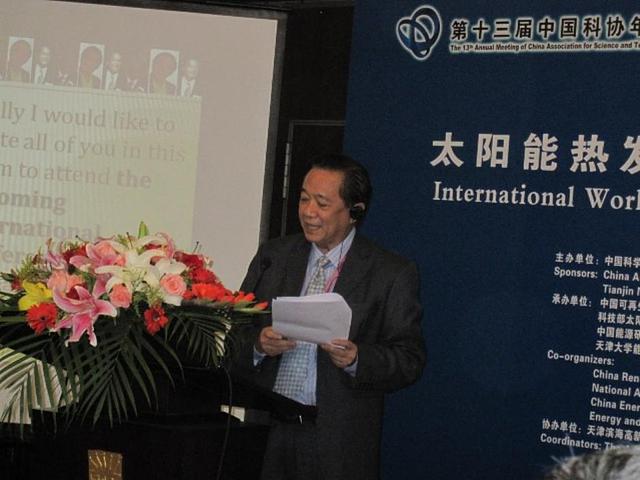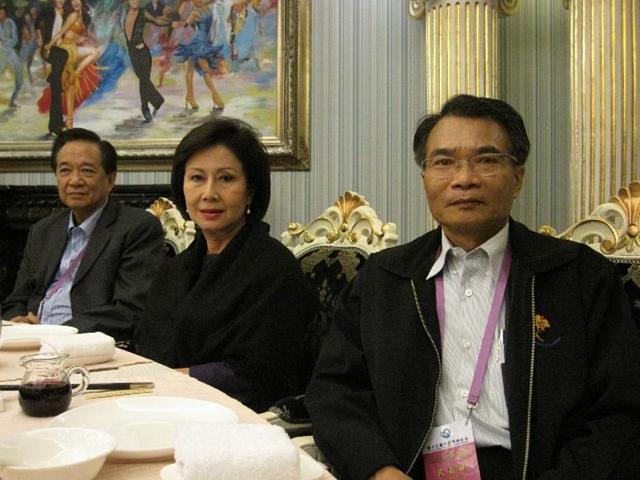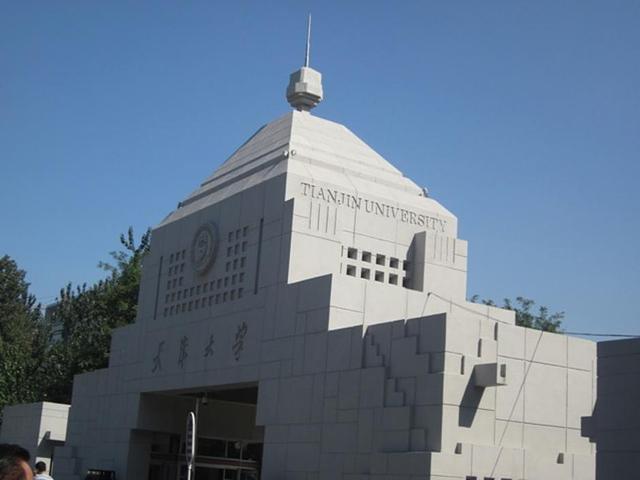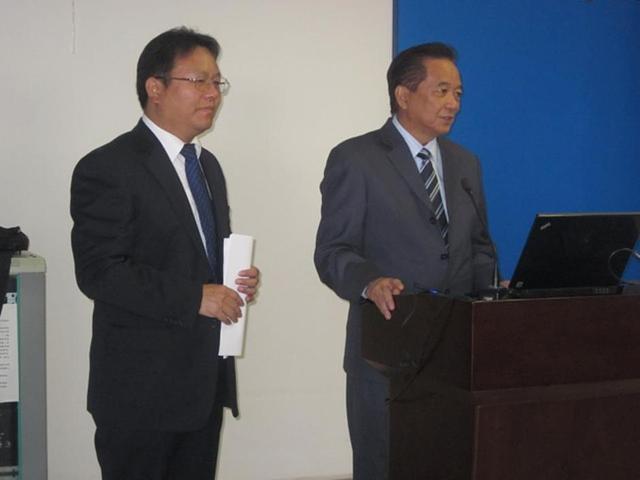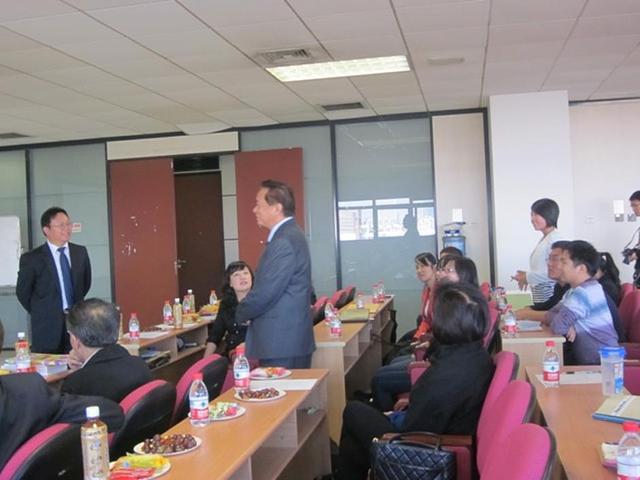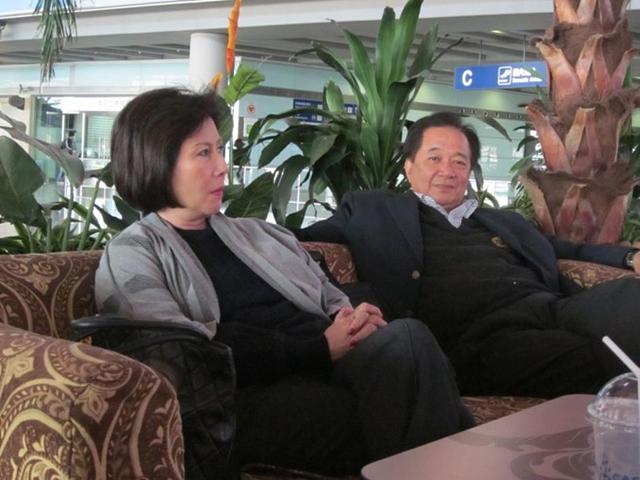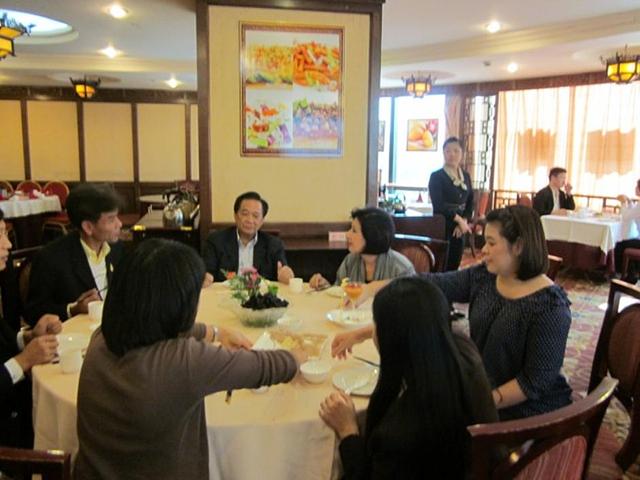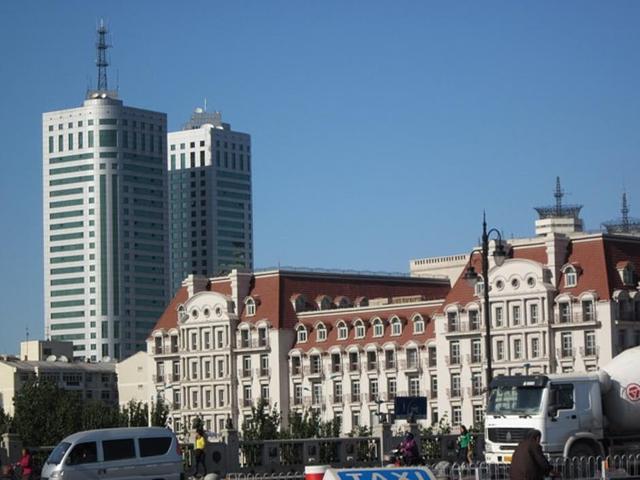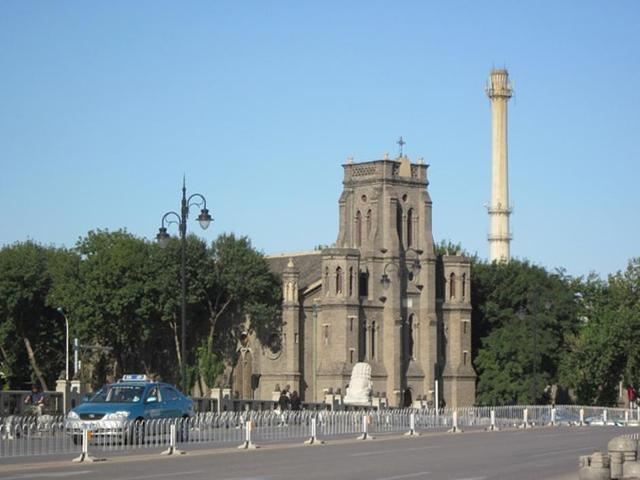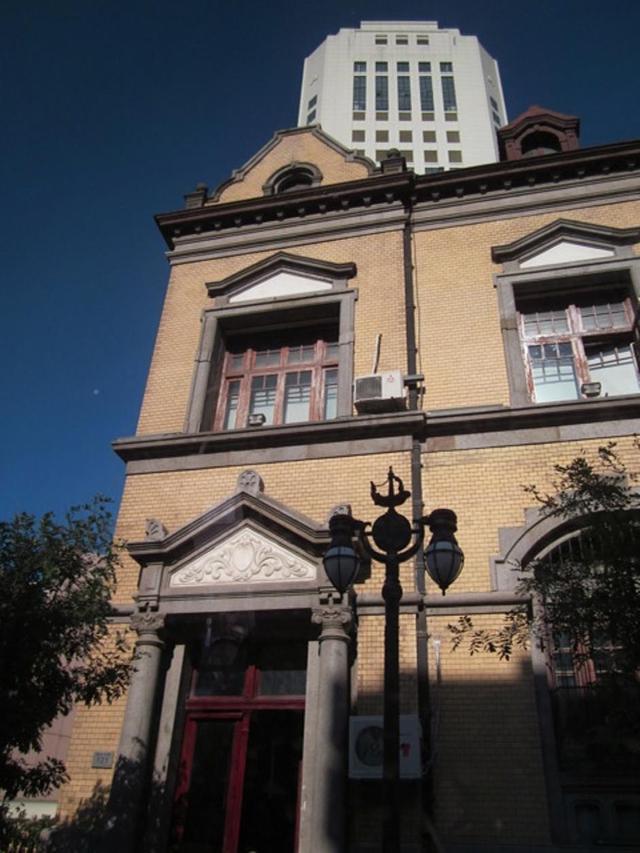Study Visit to Tianjin
International Workshop on Solar Thermal Power Technology on September 22, 2011 in Tianjin, China
Prof.Dr. Chira Hongladarom, Secretary General, Foundation for International Human Resource Development (FIHRD) was invited to deliver the opening remark at International Workshop on Solar Thermal Power Technology on September 22, 2011 in Tianjin, China. He emphasized FIHRD’s role in human capital development for energy and environment sector and invited the guest of this workshop to join FIHRD’s future energy project in Thailand.
For more information, please click on this link.
http://www.gotoknow.org/file/chiraacademy/2chira.WAV
Mr. Shi Dinghuan, Counselor of the State Council, President of China Renewable Energy Society as an organizer presented his opening remark. He talked about the project’s background and welcomed all guests.
For more information, please click on this link.
http://www.gotoknow.org/file/chiraacademy/1shiopening.WAV
At this workshop, there were many interesting sessions as follows.
Keynote speech by Prof. Carlo Rubbia, Formal Chairman of Italian National Agency for New Technologies, Energy and Environment, Awarder of the Nobel Prize for Physics in 1984
http://www.gotoknow.org/file/chiraacademy/3profRubbia.WAV
Keynote speech on The Status of the Solar Power Industry in China
By Prof. Huang Xiang, Senior Engineer of China Huadian Cooperation Group, Chief Scientist of the Solar Thermal Power Project of National ‘973 Plan’
http://www.gotoknow.org/file/chiraacademy/4Huang.WAV
Q&A session
http://www.gotoknow.org/file/chiraacademy/5QandA1.WAV
Presentation on the Status of the Solar Power Industry in Spain
by Dr. Jorge Servert del Río, Spanish Chair of China-Spain Renewable Energy Promotion Center, CEO of Solar Technology Advisors (CIEMAT spin off), Team leader of ADB CSP project
http://www.gotoknow.org/file/chiraacademy/6Jorge.WAV
Presentation on Some Thinks on the Development of Solar Thermal Power Industry in China,Under the Background of Imperfect Industry Chain System
by Dr. Wei Dongyuan, Associate Research Fellow, Chinese Academy of Science and Technology for Development, Ministry of Science & Technology
http://www.gotoknow.org/file/chiraacademy/7Wei.WAV
Presentation on EGAT’s Experiences in PV Project and Solar Thermal
by Mr.Winai Naknam, Engineer level 10, Renewable Energy Development Department, Electricity Generating Authority of Thailand (EGAT), Thailand
http://www.gotoknow.org/file/chiraacademy/8winai.WAV
Presentation on Chinese CSP Technology Research and Marketing Growing
by Dr. Li Xin, Associate Research Fellow, Institute of Electrical Engineering, Chinese Academy of Sciences
http://www.gotoknow.org/file/chiraacademy/9Lixin.WAV
Presentation on A Practical Case Regarding Actual Operating and Construction Power Plants
by Dr. Julian Lopez Garrido, China General Manager, ABENGOA SOLAR
http://www.gotoknow.org/file/chiraacademy/10Julian.WAV
Presentation on Solar Resources in China
by Mr. Shen Yanbo, Associate Research Fellow, Deputy Chief, Center for Wind and solar Energy Resources Assessment (CWERA), China Meteorological Administration
http://www.gotoknow.org/file/chiraacademy/11shen.WAV
Presentation on Smart Grid Solutions and Application in Berlin
by Prof. Kai Strunz, TU BerlinRecent
http://www.gotoknow.org/file/chiraacademy/12Kai.WAV
Presentation on Progress on Thermoacoustic Heat Engines for Dish Solar Power Generation
by Mr. Luo Ercang, Research fellow, Technical Institute of Physics and Chemistry, Chinese Academy of Sciences
http://www.gotoknow.org/file/chiraacademy/13Luo.WAV
Presentation on The R&D of 1.5MW Solar Assisted Thermal Power Experimental Demonstration System
by Mr. Zheng Jiantao (Senior Engineer, Clean Energy Research Institute of China Huaneng Group)
http://www.gotoknow.org/file/chiraacademy/14Zheng.WAV
Presentation on Standardization for Solar Tracking System in Parabolic Trough CSP
By Mr. Zhu Wei, General Manager, Thermalfocus Solar Power Ltd.
http://www.gotoknow.org/file/chiraacademy/15Zhuw.WAV
Q & A
http://www.gotoknow.org/file/chiraacademy/16QnA3.WAV
ภาพบรรยากาศ
วันที่สาม (22/9/54)
International Workshop on Solar Thermal Power Technology
วันที่สองของการเดินทาง (21/9/54)
ไปเยี่ยมมหาวิทยาลัยเทียนสิน - บริษัทผลิตภาพยนตร์และละครชื่อดังของเมืองเทียนสิน - เรียนรู้เรื่องความก้าวหน้าของพลังงานแสงอาทิตย์และเทนโนโลยี
วันแรก เดินทางมาถึงเมืองเทียนสิน ประเทศจีน
ความเห็น (12)
ข้อมูลเกี่ยวกับเทียนจิน (จาก วิกิพีเดีย)
เทียนจิน (Tianjin) (ภาษาจีน: 天津; พินอิน: Tiānjīn; พินอินระบบไปรษณีย์: Tientsin) คือหนึ่งใน 4 เทศบาลนครของจีน เทศบาลนครเทียนจินมีระดับเทียบเท่ากับมณฑลและปกครองจากรัฐบาลกลางโดยตรง พื้นที่ของเทียนจินเป็นเมืองที่มีพื้นที่ใหญ่เป็นอันดับ 3 ในจีนแผ่นดินใหญ่ จัดเป็นเมืองใหญ่อันดับ 3 ของประเทศจีน มีฉายา "เซี่ยงไฮ้ทางเหนือ" เนื่องจากประวัติที่เดิมเคยเป็นเมืองเช่าของตะวันตก การส่งออกอุตสาหกรรมหนัก เป็นเมืองท่าขนาดใหญ่และมีสถาปัตยกรรมแบบตะวันตก
ที่ตั้งและอาณาเขต
- ทิศเหนือ ติดต่อกับ กรุงปักกิ่ง ประเทศจีน
- ทิศใต้ ติดต่อกับ ทะเลจีนตะวันออก
- ทิศตะวันออก และ ทิศตะวันตก ติดต่อกับ มณฑลเหอเป่ย
ภูมิศาสตร์
เทียนจิน ตั้งอยู่ทางด้านตะวันตกเฉียงเหนือติดกับปักกิ่ง ด้านตะวันออกติดกับอ่าวป๋อไห่ (Bohai Bay) มีสถานภาพเป็น "เทศบาลเมือง" (Special Municipality) ซึ่งการปกครองขึ้นตรงต่อรัฐบาลกลาง ห่างจากเมืองปักกิ่งซึ่งเป็นเมืองหลวง ประมาณ 120 กิโลเมตร
พื้นที่เมืองของเทียนจินตั้งอยู่ตามแม่น้ำไห่เหอ (Hai He River) ท่าเรือที่อยู่ห่างไกลตั้งอยู่บนอ่าวป๋อไห่ (Bohai Gulf) บนมหาสมุทรแปซิฟิก เทศบาลนครเมียนจินมีพรมแดนติดต่อกับเหอเป่ย ไปทางเหนือ ใต้ และ ตะวันตก ติดต่อกับเทศบาลนครปักกิ่งในส่วนเล็ก ๆ ทางตะวันตกเฉียงเหนือ และติดต่อกับอ่าวป๋อไห่ไปทางตะวันออก
เศรษฐกิจ
เทียนจิน นอกจากจัดเป็นเมืองท่าที่ใหญ่เป็นอันดับ 3 ของประเทศจีนท่าเรือเทียนจินมีสินค้าเข้าออกราว 160 ล้านตัน โดยสินค้าที่ผ่านท่าเรือแห่งนี้กว่า 80% เป็นถ่านหิน แร่ธาตุ และผลิตภัณฑ์น้ำมัน จึงนับเป็นศูนย์ท่าเรือใหญ่ริมทะเลป๋อไห่ทางภาคเหนือของประเทศ ยังเป็นเมืองอุตสาหกรรมที่สำคัญและเป็นศูนย์กลางทางการค้า การขนส่งการสื่อสารที่สำคัญของจีนตอนเหนือ มีชายฝั่งทะเลยาว 133 กม.ทางฝั่งตะวันออก อุดมด้วยทรัพยากรทางทะเล และยังเป็นเขตเมืองท่าและฐานอุตสาหกรรมทางทะเลที่สำคัญของประเทศ โดยเฉพาะอุตสาหกรรมปิโตรเคมีในมหาสมุทร
| ข้อมูลทั่วไป | |
| ความหมายของชื่อ | 天 เทียน - สวรรค์ 津 จิน - บริเวณน้ำตื้นในแม่น้ำ "น้ำตื้นของฮ่องเต้" |
| ปีสถาปนา | |
| ประเภทเขตปกครอง | เทศบาลนคร |
| เลขาฯเขตปกครอง แห่งCPC | จาง ลี่ชาง (张立昌) |
| ผู้ว่าการ | ไต้ เซียงหลง (戴相龙) |
| พื้นที่ | 11,920 กม.² (อันดับที่ 30) |
| - ความสูงที่ตั้ง | 10 เมตร(33 ฟุต) |
| ประชากร | (ข้อมูลปี พ.ศ. 2549) |
| - เขตเมือง | 6,000,000 |
| - ความหนาแน่น | 859 คน/กม (อันดับที่ 3) |
| - ปริมณฑล | 11,500,000 (อันดับที่ 27) |
| GDP (พ.ศ. 2547) | 363 พันล้าน เหรินหมินปี้ (อันดับ 21) |
| - ต่อหัว | 28,600 เหรินหมินปี้ (อันดับ 3) |
| HDI (พ.ศ. 2548) | 0.855 |
| ชาติพันธุ์หลัก |
ฮั่น - 97% ฮุย - 2% แมนจู - 0.6% |
21 September 2011
Seminar at Institute of Human Resource and Social Security of Tianjin University
Welcome Address by Prof. Liang
- I would like to extend warm welcome all of you.
- Our Institute of Human Resource and Social Security has 7 teachers and 6 associate professors.
- Our Institute has strong capacity in research field.
- We conducted research at the national level as follows.
- The research on graduates’ employment
- The research on employment stimulation in China.
- We conducted research at the municipal level as follows.
- The research on compensation structure
- The research on payment structure
- We conducted research support policymakers.
- Our research support gender equality such as women’s union, investing in supporting system and social security.
- We also have international alliances.
Presentation on Human Capital in Thailand China – Thai future cooperation
by Prof. Dr. Chira Hongladarom, Secretary – General, Foundation for International Human Resource Development
1)It is a great honor to be here.
2)My objectives are;
É To discuss the role of human capital in economic and social development in Thailand.
É To cement further strong relationship with people of China.
É To explore cooperation between my Foundation and Institute of Human Resource and Social Security of Tianjin University
É To discuss the long-term relationship between Thailand and China in economic areas.
3)My work in the field of human capital started at Thammasat University, more than 35 years ago.
- I was the founder of the well-known Human Resources Institute at Thammasat University and was the first executive Director and stayed in the job for 20 years.
- At that time, the Institute was the pioneer in pushing for human resources policy in Thailand both at macro and micro level.
- Moreover, I was elected as Chairman of Tripartite National Labor Institute which is the policy making body of labor in Thailand.
- My contribution was to promote and create awareness of importance of human capital as important as financial, physical and natural resources capital.
- The Institute also played a big role in supporter the passing of historic Social Security Legislation about 20 years ago.
4)With my rich experience, the government has asked me about 12 years ago to set up the Foundation for International Human Resource Development which later approved by cabinet by the Royal Government of Thailand.
- The Foundation believed in working together with other neighbor countries especially countries of ASEAN+6 which includes China and GMS and others.
- The latest work is the 20-day workshop on human capital development in energy and environment sector, in which representatives from Yunnan and Guangxi Provinces and Beijing joined.
- The future work will be International Conference on Energy and Environment Sector
Cooperation among GMS Countries (Phase 3)
on March 5-17, 2012. - This project will be divided into 3 sessions as follows.
- 5-day Pre-Conference Workshop on Environmental Agencies Case Studies
- 3- day International Conference on Energy and Environment Sector Cooperation among GMS Countries (Phase 3)
- 5-day Post-Conference Workshop on HRD and HRM in Energy
5)My previous position with the support from the People’s Republic of China as:
- Lead Shepherd of APEC HRD Working Group. 2005 – 2007 during my term, I was guest of honor in China several times with my APEC role.
6)My Concern in Thailand is that at Macro level, the investment in human capital is conducted without great results.
7)Under my advice, the present Government tried to develop second decade of education reform which concentrate on;
- Lifelong Learning
- Learning Methodology
- Management and leadership development among school administrators and Govn’t bureaucrats .
- Networking with other stakeholders in Education
8)Another weakness of human capital development is;
- Weakness in the role of families.
- Wrong Social values which maximize material gain.
- Influence of Western values to Thailand.
9) At enterprise level, the role in human capital development is so crucial.
- The Weakness are;
(1) CEO-maximize only short term gain.
(2) Human Resource people deal with functioning area.
(3) Non-HR people, line managers do not trust the HR function.
10) In the last 10 years, I have developed new concepts for learning culture
4 L’s
q Learning Methodology
q Learning Environment
q Learning Opportunities
q Learning Communities
2 R’s
- Reality
- Relevance
2 i’s
- Inspiration
- Imagination
- As a way to stimulate people at macro and micro to think strategically and critically.
- As far as human capital qualities are concerned I developed Theory of 8K’s and 5K’s for Human Capital Development.
8 K’s Theory: basic in Human Resource Development
1) Human Capital
2) Intellectual Capital
3) Ethical Capital
4) Happiness Capital
5) Social Capital
6) Sustainability Capital
7) Digital Capital
8) Talented Capital
5 K’s (New) Theory: Human Resource Development in globalization
- Creativity Capital
- Knowledge Capital
- Innovation Capital
- Cultural Capital
- Emotional Capital
- And finally..I believed that maximize human potential following this quotation..
“Cultivation is necessary but harvesting is more important.” Chira Hongadarom
To have qualified Human Capital is not enough-you must create inspiration and incentives for quality Human Capital to become excellent.
I call it 3 Circles Theory
1. Context
2.Competencies
3.Motivation
11) “How to..” is not important as “how to do it successful both at Macro and Micro level”. China’s experience is important. I believe that my visit to China this time, discussing with all the experts in this room, we can learn from one another.
12) My visit to your institute is to explore future research cooperation which China has a great deal of experiences.
13) People in China and Thailand have known each for more than 200 years.
As you may know, the Chinese migrated to Thailand more than 100 years ago, and Chinese and Thai have been assimilated.
I am also Chinese 25% because my father was Chinese origin married my Thai mother.
14)With the world moving into uncertainty and unpredictability, China and Thailand should work together in many other areas;
q Economics
q Trade
q Transport (logistics)
q Tourism
q Education and human resource
q Medical Science
q R&D
q Others
15) I consider myself as People Ambassador who believe in trust, equality, and mutual respect between Thailand and Republic of China’s people.
16) China will be world power less than 20 years from now. We look forward to create creative collaboration in many areas.
Thank you very much.
Presentation on Research by Prof. Liang
- I wrote my book on “50 principles of psychology” which is about psychological issues reflecting on my educational background and my teaching. This book helps handling at the Micro level especially individual attitude and harmony. Employers must understand individual differences
- One child policy has posted a lot of impacts on workforce. When these children are grown up, they do not know how to handle the relationship. The employers must get used to this trend and should make them happy to work.
- The second paper is from Prof. Zhang. It focuses on women labor force with high education but they get burned out of work. This paper explains why they easily get burned out.
Comments from Prof. Dr. Chira Hongladarom
- You have highlighted two research papers.
- One child policy has a lot of impacts on human resource.
- In engineering class, 50% are women.
- Elizabeth Canter says “The most difficult leadership is never discovering yourself”.
- Thailand and China should do joint research on women’s leadership.
- Women need balance in life.
Presentation on Research by Prof. Liang
- I do research on urban employment and how to promote employment.
- Another research I do is Career Planning.
- I agree with your ideas of Human Capital.
- If you have career planning, it will lead to more ambition and motivation.
- This book also has chapter on work-life balance.
Comments from students
1. Thank you very much, Dr. Chira. Could you please explain Happiness Capital? How can you measure and turn it into productivity?
Prof. Dr. Chira Hongladarom
- Happiness is a part of your own. It is happy workplace.
- Happiness Capital has these components
- Health-never work in stressful life.
- Passion-love what you do
- Purpose-what is the job for?
- We can measure Happiness by ranking from 0-10.
- Happiness is one component of performance. Performance can be influenced by other factors.
2. What are the differences between Reality and Relevance?
Prof. Dr. Chira Hongladarom
- Reality-some theories can be applied to the real situation especially the local context.
- Relevance –something related to you like the collaboration between Thailand and China. Do not use textbooks to apply to all situations.
21 กันยายน 2554
การประชุมหารือกับ Tianjin Jin Yuan Movie and TV Co., Ltd.
ศ.ดร.จีระ หงส์ลดารมภ์
- วันนี้จะมาหารือเพื่อนำละครโทรทัศน์ไทยทีวีสีช่อง 3 มาออกอากาศที่สถานีนี้
- ถ้าท่านมีละครดี เราก็จะนำไปเสนอต่อไทยทีวีสีช่อง 3 ด้วย
ผู้แทน Tianjin Jin Yuan Movie and TV Co., Ltd.
- พวกเราประทับใจที่อาจารย์ให้ความสำคัญการแลกเปลี่ยนวัฒนธรรมทางละคร ถือเป็นการให้กำลังใจบริษัทเราเพื่อสร้างละครดีๆต่อไป
- พวกเราเห็นด้วยที่จะมีการแลกเปลี่ยนละครจีนกับอาเซียน ตอนนี้กิจการภาพยนตร์ในจีนกำลังเจริญรุ่งเรือง
ศ.ดร.จีระ หงส์ลดารมภ์
- ในอนาคต อาจจะมีความร่วมมือระหว่างไทยจีนในการผลิตละครและภาพยนตร์มากขึ้น
ผู้แทน Tianjin Jin Yuan Movie and TV Co., Ltd.
- พวกเราเต็มใจร่วมมือและพร้อมหารือตลอด
- วันนี้ที่ท่านมาเยี่ยมถือเป็นโอกาสที่ดี
- ต่อไป ถ้าพวกเราสนใจ ก็จะติดต่อไปยังไทยทีวีสีช่อง 3
ศ.ดร.จีระ หงส์ลดารมภ์
- เราได้รับมอบหมายจากไทยทีวีสีช่อง 3 โดยตรงให้มาดูแลการเชื่อมโยงละครจีน
- เรื่องความร่วมมือในการผลิตละครและภาพยนตร์ก็เป็นเรื่องจำเป็น
- สิ่งที่สำคัญที่สุดตอนนี้คือทุนทางวัฒนธรรมซึ่งไทยและจีนได้สะสมมานานพันๆปี
ผู้แทน Tianjin Jin Yuan Movie and TV Co., Ltd.
- ประเทศจีนก็ได้รับวัฒนธรรมไทยมามาก
ศ.ดร.จีระ หงส์ลดารมภ์
- ผมสนใจปรัชญาเต๋าและขงจื๊อ
- ผมได้ทฤษฎีความสุขจากขงจื๊อโดยเฉพาะอย่างยิ่งการดำรงชีวิตอย่างสมดุลระหว่างมนุษย์กับธรรมชาติ
ผู้แทน Tianjin Jin Yuan Movie and TV Co., Ltd.
- ประเทศจีนมีวัฒนธรรมที่หลากหลายและประวัติศาสตร์ที่ยาวนาน
- ขงจื๊อกล่าวว่า “มีเพื่อนมาจากแดนไกล ก็ต้องดูแลต้อนรับให้ดี”
- แนวคิดจีนมีหลายอย่าง เช่น ขงเบ้ง เต๋า ซุ่นจื่อ
- พวกเราประทับใจและขอขอบคุณที่ท่านสนใจวัฒนธรรมจีน
- เมื่อ 5-6 ปีก่อน บริษัทเราได้ไปถ่ายทำละครเรื่อง ฤดูฝนที่กรุงเทพ ที่ประเทศไทย
- หวังว่า ต่อไปจะได้ร่วมมือด้านละครกับประเทศไทยในอนาคต
- อาจจะเชิญผู้จัดการไทยทีวีสีช่อง 3 มาร่วมมือ หรือเราอาจจะไปเยี่ยมไทยทีวีสีช่อง 3ด้วย
- ละครจีนจะเผยแพร่วัฒนธรรมไปยังต่างประเทศเหมือนกับละครเกาหลี
- อาจจะนำดาราไทยมาโปรโมทที่จีนได้ด้วย
ศ.ดร.จีระ หงส์ลดารมภ์
- จะมีการแลกเปลี่ยนดารา และละคร และมีการให้ลิขสิทธิ์แปลละครเป็นภาษาจีน
ผู้แทน Tianjin Jin Yuan Movie and TV Co., Ltd.
- เรากำลังจะเตรียมตัวทำละครยุคปี1920-1930 จะเชิญดาราไทยมาร่วมแสดงด้วย
ศ.ดร.จีระ หงส์ลดารมภ์
- ขอบคุณมากครับ
- เราจะวางแผนความร่วมมือด้านวัฒนธรรมและกระจายความรู้ไปยังประเทศอื่นๆในอาเซียน อินเดีย ยุโรปและสหรัฐอเมริกา
21 September 2011
Study Visit at SETC
- SETC is an American company specializing in the research and commercial application of Concentrating Solar Power (CSP) technology. Currently, SETC has two patented systems in its innovation portfolio, SUNSAIL® and CENICOM®. Both systems are equipped with large-scale storage capability, which can be configured as a base-load and dispatchable power system generating electricity on non-intermittent basis. SETC designs, constructs, commissions and operates CSP power plants in global market. A number of commercial demo projects are under construction/development in prospective markets including China, USA, Middle East and South Africa etc. Supported by its unparalleled technological advantages, SETC is emerging to become a premier supplier of integrated CSP system solutions in the world.
- SETC was awarded the trophy for “Excellence in the Field of Environmental Technology Development” at the Clean Equity Monaco 2009 Conference.
- SETC is headquartered in NY, USA, under which there are two wholly-owned subsidiaries in China, SETC (China) and SETC (Tianjin). As Asian-Pacific regional headquarter, SETC (China) is responsible for regional operations in terms of strategic planning, business development, project management and R&D. SETC (Tianjin) is a manufacturing arm with an annual production capacity of 140 MW.
- • SETC offers two solutions as follows
-
SUNSAIL®
SUNSAIL® system is a high-performing CSP technology that offers a sustainable solution for displacing coal-fired power plants at scale. Armed with large-scale storage capability, SUNSAIL® can be configured as a base-load and dispatchable system that generates electricity on a 24 hours non-intermittent basis without using any auxiliary fuels. Other distinctive features include high-efficiency and cost-effectiveness, safety and reliability, modularity and scalability. -
CENICOM®
CENICOM® is the registered trademark of the CSP technology owned by SETC. The system uses a cluster of mirrors to collect the solar energy and to convert it into thermal energy. The thermal energy is then transported to a steam generator to produce steam for power generation directly, or to a storage device (Vault) for later use. The process of solar energy collection and power generation can be scheduled simultaneously or separately.
For more information, please click on this link.
Great and variety topics for one trip. Especialy the issue of concentrate of education reform link to human capital in macro and micro.
Thank for good relationship with this university that yours as team of Thailand was made.
Phramaha Sathit Metheejanyaporn
Ed.D. Candidate of SSRU Class 5
โปรดคลิกที่ลิ้งค์นี้เพื่ออ่านข่าวโครงการ
I like the pictures of tall buildings of the city and the a cold atmosphere shown in them.
Please click these links to witness these events on Septermber 23, 2011.
The meeting between FIHRD and Energy Resources and Environment Professional Council of All-China Environment Federation
http://www.gotoknow.org/file/chiraacademy/chinaenvironmentcommittee23sept2011.WAV
The meeting between FIHRD and China television Production Committee
http://www.gotoknow.org/file/chiraacademy/chinafilmproduction23sept2011.WAV
Please click this link to listen to the discussion after the Study Visit at SETC on 21 September 2011.
http://www.gotoknow.org/file/chiraacademy/3SECTstudyvisit21sept.WAV
Title: Example of People-to-People Diplomacy in Tianjin, China
Column: Learning from Reality with Dr. Chira Hongladarom
Source: Naewna. September 24, 2011, p.5
I led my team to fly from Bangkok to Tianjin. Tianjin has been a very important city of China since historical period. Because it was influenced by the western countries for a long time, France, the U.K., Germany, Belgium and Russia were allowed to do business and have extraterritoriality. Tianjin became an important industrial city and ancient learning center.
I read history of Tianjin long time ago. I never think I will have a chance to join the meeting here. I want Thais to pay attention to Tianjin. If they come to Beijing, they can proceed to Tianjin for one or two more days. Now, it takes only half an hour from Beijing to Tianjin by hi-speed trains.
While I was writing this article, I was still in Tianjin until Friday. This is the 5th or 6th largest city in China. It has a population of more than 10 millions. Like other cities of China, it has wide roads and a lot of constructions especially, skyscrapers.
I have two main points of discussion as follows.
First, I was invited to make a presentation at Institute of Human Resource and Social Security of Tianjin University.
This university is very old. It is almost 120 years old. It was established in 1895. Institute of Human Resource and Social Security of Tianjin University invited 30 participants consisting of Ph.D. and Master’s Degree students and teachers to listen and share knowledge for more than two hours.
My lessons learnt are as follows.
This institute has conducted several research studies on human capital in China especially population problem of China. Formerly, each family was limited to have only one child. At the present, it helps decrease Chinese population a little bit but causes a lot of social problems to Chinese families.
An interesting finding from this research is that forcing the family to have only one child will lead to aggressive behaviors, mental problem, social and family problem. These children are self-centered. When they become disappointed with their works and studies, they are like to commit suicide and lead to high dead toll because their families spoil them.
This makes me think of Thai society. Spoiling child will worsen the quality of child and human resource in the future as well. They lack Sustainability Capital. Thai children will become aggressive, easily frustrated and lack patience.
There was much academic exchange on human capital. I presented human capital concepts such as 8K’s and 5K’s including future cooperation between FIHRD and Tianjin University.
I invited lecturers from Tianjin University to visit Thailand to create academic cooperation. If any Thai universities are interested in cooperation with Tianjin University, they can contact me.
On September 22, China Renewable Energy Society (CRES) organized a big event called "International Workshop on Solar Thermal Power Technology" and invited me to deliver the opening remark.
EGAT sent Mr. Winai Naknam to join this event and present Thailand’s case study on solar energy.
Most participants were solar energy experts. Many of them were from Europe. It was a great honor for me to join this event, deliver the opening remark and present works of which I was proud. I would like to admire Mr. Suthat Pattamasiriwat, EGAT’s Governor for placing emphasis on international relation and cooperation creation. He took this opportunity to well present Thailand’s image of solar energy to the world.
In my opening remark, I mentioned about these points.
- Alternative energy becomes more important in the future world lacking oil.
- The cooperation between Thailand, GMS, China and other group like Europe.
- China will become the leader of alternative energy because of concern for global warming creating good image for China to solve global warming in the future.
- Do not emphasize on engineering and science only. Pay attention to education, economics, energy law and human resource development in alternative energy.
- Energy conservation is still important. Do not look at supply side only, but also look at demand side.
- Even though this workshop focuses on solar energy, wind, biomass and biogas remain very important.
- China greatly invests in research and development preparation for solar thermal energy because it will reach the breakeven point within the next 15-20 years. Therefore, preparation is needed. This should be a good role model for Thailand in the long term.
I invited the participants from this workshop to join the International Conference which FIHRD will organize as the phase 3 project from March 5-17, 2012 in Thailand. This will be the final conference on human resource development for alternative energy of GMS countries.
The first five days will focus on environment and energy problem.
The next three days will be the International Conference concluding the last two year’s work. OECD, ADB, World Bank’s delegates will be invited to join.
The last five days will focus on human resource development for alternative energy development.
On this trip to China, I met and took this opportunity to invite several experts like Prof. Carlo Rubbia, Italian Nobel Prize Award Winner and Prof. Jorge Servert del Rio from Spain to join the Conference in Thailand.
All works become successful because of the full support from Thailand’s Ministry of Foreign Affairs especially Dr. Apinan Phatarathiyanon, Director-General of Thailand International Development Cooperation Agency (TICA), Ms. Suchada Thaibunthao and Ms. Veraya Jaru-ampornpun who give us encouragement in starting effective People-to-People Diplomacy.
Mr. Wu Zhiyi, the Chinese Government’s representative always coordinates well and greatly welcomes our group.
People-to-People Diplomacy is important. Government alone cannot make it.
This is my report from Tianjin.
Please click this link to see pictures.
http://www.naewna.com/news.asp?ID=280817
Prof. Dr. Chira Hongladarom
ที่มา: Stock Review ปีที่ 3 พฤศจิกายน 2554

